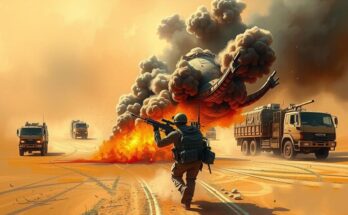South Sudan is on the verge of renewed civil war as warned by U.N. envoy Nicolas Haysom, who cited the government’s cessation of peace talks as a critical factor. The ongoing ethnic tensions and mistrust between President Kiir and Vice President Machar threaten the country’s stability, particularly as elections loom. The U.N. is pursuing intense diplomatic efforts to encourage dialogue and adherence to the 2018 peace agreement.
South Sudan is facing the imminent risk of renewed civil war, as warned by Nicolas Haysom, the top United Nations official in the country. He expressed concern over the government’s abrupt postponement of peace initiatives, calling the circumstances burgeoning in South Sudan “dire.” For a sustainable peace process, he asserts that both President Salva Kiir and the vice president, Riek Machar, must prioritize their citizens’ interests over personal agendas.
Since achieving independence from Sudan in 2011, following a prolonged conflict, South Sudan has grappled with instability. The situation deteriorated into civil war in December 2013, primarily driven by ethnic tensions between Kiir’s Dinka faction and Machar’s Nuer faction, resulting in over 40,000 fatalities. Although a peace agreement in 2018 aimed to foster unity by bringing both leaders together in governance, crucial elections have experienced multiple delays, initially slated for February 2023 but now postponed until 2026.
Current unrest is exacerbated by clashes in northern South Sudan involving government forces and a rebel group known as the White Army, which is reportedly allied with Machar. Recent violence has included the fatal shooting of a South Sudanese general during a UN helicopter evacuation mission in Nasir, amid escalating chaos in Upper Nile state. Following an attack by the White Army on a military garrison, government troops have taken aggressive measures against Machar’s associates in Juba.
Haysom noted the increasing tension and violence correlates with the approaching elections, which intensifies political competition. He highlighted the lack of trust between Kiir and Machar as a hindrance to fulfilling the 2018 peace agreement, thereby failing to pave the way for a stable democracy. The proliferation of misinformation and hate speech further aggravates ethnic divisions and societal fears.
He emphasized, “Given this grim situation, we are left with no other conclusion but to assess that South Sudan is teetering on the edge of a relapse into civil war.” The UN peacekeeping chief underscored the dire consequences that would follow a return to conflict, reminiscent of the horrific events of 2013 and 2016. The organization is aggressively pursuing shuttle diplomacy involving international partners, including the African Union, to avert such a catastrophe.
Continuous calls have been made for Kiir and Machar to negotiate their differences, uphold the 2018 peace deal, observe the ceasefire, liberate detained officials, and engage in dialogue instead of hostilities, forming a united front against resurgent violence.
In conclusion, South Sudan stands on the brink of renewed civil war due to lingering ethnic tensions and political rivalries. The UN envoy has highlighted the critical need for both leaders to prioritize peace efforts over personal interests and to return to the 2018 peace agreement. Preventative measures, involving international and regional partnerships, are essential to avoid a return to widespread violence and chaos in the nation.
Original Source: halifax.citynews.ca




